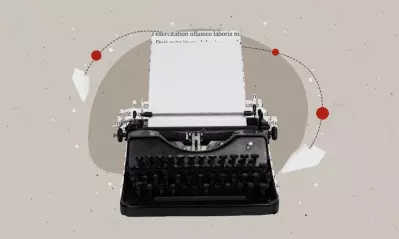Articles > Liberal Arts > Careers and jobs in creative writing
Careers and jobs in creative writing

Written by Michael Feder

Reviewed by Briana Houlihan, MBA, G-PM, Dean, College of General Studies

What comes to mind when you hear “creative writing?” You might imagine someone writing poetry or the “the Great American Novel.” But there are jobs in creative writing that can allow you to build a career around your writing skills.
Where can you find jobs in creative writing?
Creative writing skills can unlock numerous personal and professional opportunities. These skills are highly valued across various industries. If you take a look at job descriptions in virtually any field, you’ll find that businesses often need skilled writers to help create persuasive content that engages their audience, conveys their brand message and drives action. Writing skills, in other words, can help you go down any number of career paths.
Writing skills can apply to a wide range of jobs in creative writing. Consider, for example, blog articles, marketing materials, website copy, social media content and magazine articles. These are all forms of creative writing are used by organizations for communication and marketing purposes and are separate from the creative writing genres of novels and short stories, poems and scripts.
Creative writing can be applied to many roles and industries that you may not initially consider creative. To give you a better understanding, consider the following examples:
- Technical writers, who produce precise, clear instructions for complex processes or equipment, can benefit from creative writing skills. While accuracy and clarity are crucial, so is engaging the reader. Creative writing techniques help technical writers make their content more interesting and easier to understand.
- Crafting an effective purpose statement for your business is another area where creative writing skills come into play. A purpose statement should communicate what your company does and why — ideally in a way that resonates emotionally with your market. Getting this right is important to the overall success of a business.
No matter what role you’re in, learning to write creatively can help you communicate effectively, engage your audience and persuade them to take a desired action.
Creative writing jobs
Copywriters
Copywriters are professionals who specialize in creating written content, often for the purpose of advertising or marketing. Their main responsibility is to produce persuasive and compelling copy that promotes a product, service, brand or idea. Copywriters use their creativity and language skills to craft messages that resonate with a target audience, drive engagement and ultimately encourage a desired action, such as making a purchase or clicking on a link.
Whether it’s in advertisements, promotional materials, websites or other marketing channels, the goal of a copywriter is to create content that effectively communicates the value proposition [EE1] of a product or service while capturing the attention and interest of the audience.
Proofreader or copy editor
Proofreaders are professionals who meticulously review written content to identify and correct errors in grammar, spelling, punctuation and syntax. Their primary focus is on ensuring the text is free from typographical mistakes and adheres to proper language conventions. Proofreaders play a crucial role in enhancing the overall quality and clarity of a document by polishing its final draft.
Copy editors, on the other hand, are responsible for a more comprehensive review of written material, with a focus on improving style, coherence and overall readability. In addition to correcting grammar and spelling errors, copy editors analyze the structure and flow of the text, suggesting revisions to enhance the clarity and effectiveness of the writing. They may also address issues related to consistency in tone, style and formatting, ensuring that the content aligns with the intended audience and purpose. Copy editors contribute significantly to the refinement and professional presentation of written works.
Editorial assistant
Editorial assistants are professionals who provide support to editors in the publishing industry, whether it be in book publishing, magazines, newspapers or other editorial contexts. Their role involves a range of administrative tasks and editorial responsibilities.
Editorial assistants often help with the acquisition and evaluation of manuscripts. They may also communicate with authors and contributors and help coordinate the publication process. Other responsibilities can include fact-checking, proofreading and ensuring that written content adheres to editorial guidelines and standards.
Additionally, editorial assistants may handle correspondence, manage schedules and assist with the overall organization of editorial projects.
Content coordinator
A content coordinator is a professional responsible for managing and organizing the creation, publication and distribution of content across various platforms. This role often involves collaborating with content creators, writers and other team members to ensure that the content aligns with the organization’s goals and brand messaging.
Content coordinators play a pivotal role in maintaining content calendars, tracking deadlines and overseeing the workflow of content production. They may also be involved in editing and optimizing content for search engines, social media or other specific channels.
Additionally, content coordinators may liaise between departments, ensuring that the content strategy is cohesive and meets the needs of the target audience. This position requires strong organizational skills, attention to detail and the ability to collaborate.
Is there education for jobs in creative writing?
If you’re interested in learning more about skills that you can use for jobs in creative writing, University of Phoenix offers introduction to creative writing courses within its online Bachelor of Arts in English degree.
This online English degree program also includes courses like literary interpretation and analysis, introduction to technical writing and mechanics of writing. From this rich and varied curriculum, students gain a strong skill set in reading, writing, communication and storytelling that they can carry with them on any number of career trajectories.
Interested? Contact University of Phoenix .

ABOUT THE AUTHOR
A graduate of Johns Hopkins University and its Writing Seminars program and winner of the Stephen A. Dixon Literary Prize, Michael Feder brings an eye for detail and a passion for research to every article he writes. His academic and professional background includes experience in marketing, content development, script writing and SEO. Today, he works as a multimedia specialist at University of Phoenix where he covers a variety of topics ranging from healthcare to IT.

ABOUT THE REVIEWER
Briana Houlihan is the dean of the College of General Studies at University of Phoenix. For more than 20 years, Houlihan has strongly advocated for first-generation and underserved working learners. She has made it her mission to enhance the skills focus within general education coursework to bring value to undergraduate students from day one of their program.
This article has been vetted by University of Phoenix's editorial advisory committee.
Read more about our editorial process.

